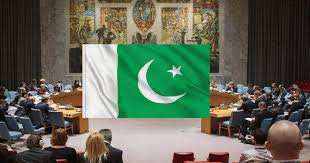Pakistan Assumes UNSC Chair
On July 1, 2025, Pakistan took over the presidency of the United Nations Security Council (UNSC) for July. This marks its eighth term as a non-permanent member (2025-26).

Deputy Prime Minister and Foreign Minister Ishaq Dar pledged to uphold the UN Charter, international law, and multilateralism.
Background of Pakistan’s Role
Pakistan was elected as a non-permanent UNSC member in January 2025, securing 182 out of 193 votes. It has served on the Council seven times before, in 2012-13, 2003-04, 1993-94, 1983-84, 1976-77, 1968-69, and 1952-53. The presidency rotates monthly among the 15 UNSC members in English alphabetical order. Pakistan’s turn follows its strong diplomatic push for global peace.
Why Pakistan Took This Role
The presidency offers Pakistan a platform to influence global security discussions. It aims to promote dialogue, diplomacy, and peaceful dispute resolution.
Pakistan seeks to address escalating conflicts and humanitarian crises worldwide. Ambassador Asim Iftikhar Ahmad emphasized a transparent, inclusive, and responsive presidency. The country also wants to highlight issues like the Kashmir dispute.
Key Events During Presidency
Pakistan plans two high-level events in July. On July 22, an open debate will focus on promoting peace through multilateralism and dispute settlement.
On July 24, a briefing will explore UN cooperation with the Organisation of Islamic Cooperation (OIC). Ishaq Dar will chair both, plus a quarterly debate on Palestine on July 23. These events reflect Pakistan’s focus on diplomacy.
Process Under International Law
The UNSC presidency rotates monthly based on alphabetical order, as per UN Charter rules. The president sets the agenda, chairs meetings, and ensures consensus on the Council’s work program.
Under Article 25 of the UN Charter, members agree to follow Council decisions, which can include sanctions or authorizing force. Pakistan’s role aligns with its commitment to international law and multilateralism.
Challenges and Expectations
Pakistan assumes the presidency amid global tensions, including conflicts in the Middle East, South Asia, and Africa.
It faces pressure to address unresolved issues like Kashmir, which it raised during a July 1 press conference. India has countered, accusing Pakistan of supporting terrorism, citing attacks like the April 2025 Pahalgam massacre. Pakistan must navigate these disputes while fostering unity and effective Council action.
Pakistan’s UNSC presidency comes at a critical time. The Council, tasked with maintaining global peace, can make legally binding decisions.
Pakistan’s Foreign Office stressed a balanced, transparent approach to tackle interlocking global challenges. Ambassador Ahmad met UN Secretary-General Antonio Guterres to discuss July’s agenda, signaling Pakistan’s intent to lead collaboratively. The country’s experience in UN peacekeeping and peace-building shapes its principled stance.
Despite its ambitions, Pakistan faces constraints. UNSC rules limit the president’s ability to push personal agendas, requiring consensus for decisions.
Tensions with India, especially over Kashmir, may complicate discussions. India plans to highlight its development achievements to counter Pakistan’s narrative. Pakistan’s alignment with China and Russia on issues like Iran could also influence dynamics. Still, Pakistan aims to bridge divides and uphold the UN Charter’s principles.
As president, Pakistan must address complex geopolitical issues, including rising conflicts and humanitarian crises. Its focus on multilateralism and peaceful dispute resolution aligns with the UN Charter’s Chapter VI. By hosting debates on global peace and regional cooperation, Pakistan seeks to strengthen the Council’s relevance. The international community watches closely as Pakistan steers the UNSC through a turbulent Ju


 Water Crisis in Pakistan 4 Urgent Letters to India
Water Crisis in Pakistan 4 Urgent Letters to India  Modi Declares Operation Sindoor Ongoing
Modi Declares Operation Sindoor Ongoing  India-Pakistan Agree on US-Mediated Ceasefire
India-Pakistan Agree on US-Mediated Ceasefire  Former UK PM Rishi Sunak Backs India’s Anti-Terror Operation
Former UK PM Rishi Sunak Backs India’s Anti-Terror Operation  Reliance Industries Seeks Trademark for ‘Operation Sindoor’
Reliance Industries Seeks Trademark for ‘Operation Sindoor’  What is India-Pakistan Line of Control (LoC)
What is India-Pakistan Line of Control (LoC)